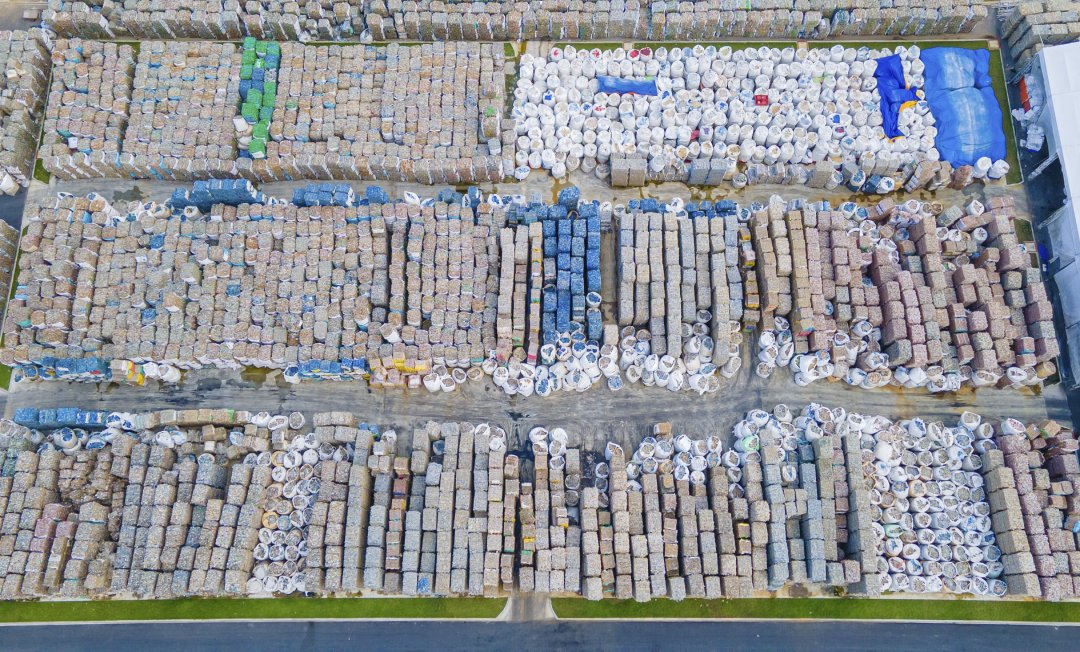While the global post-consumer recycled plastics market is expected to reach $21.64 billion by 2030, a supply-demand imbalance means that companies must rethink their supply chains.
But as global brands race to secure recycled plastics, a new challenge is emerging – ensuring the plastic collected for recycling are responsibly sourced.
The EU Packaging and Packaging Waste Regulation (PPWR) which came into force in February 2025, sets significant minimum recycled content targets for the packaging chain by 2030, intensifying the pressure on companies to secure a steady supply of quality, traceable recycled materials at stable pricing. At the same time, national adoption of policies like Extended Producer Responsibility (EPR) and recycled content mandates is increasing, as seen with India’s 30% recycled content mandate for rigid plastic packaging, such as PET bottles, which came into force in April 2025.

Plastic waste yard at DUYTAN Recycling facility. Source: DUYTAN Recycling.
With demand for recycled plastics outpacing supply, brands are turning to fast-growing recycling ecosystems – particularly in emerging markets – as future sources. But this supply chain is sustained by millions of informal waste workers who are often subject to poor working conditions, health and safety issues, gender inequality, social stigma and lack of formal protections or recognition. As scrutiny of respecting minimum human rights standards in supply chains intensifies, companies relying on these markets face growing brand and reputational risks.
This presents a clear opportunity for global brands to play a significant role in strengthening the entire supply chain while advancing human rights, promoting social equity and aligning with long-term business and sustainability goals.
These collection networks rely heavily on the informal sector, with an estimated 40 million informal waste workers contributing to nearly 60% of plastics recycling globally. In Vietnam alone, approximately 70% of plastic recycling depends on the work of informal workers, primarily women. In Indonesia, the world’s second largest producer of plastic waste, an estimated two million informal waste sector workers collect around one million tons per year.
 Informal waste collectors remain the main labor force responsible for keeping the streets in major Vietnam cities clean. Source: Internet.
Informal waste collectors remain the main labor force responsible for keeping the streets in major Vietnam cities clean. Source: Internet.
Lack of recognition of this large informal workforce contributes to opaque, fragmented supply chains where pricing and materials are difficult to trace. This not only undermines transparency but also results in supply inconsistencies and limits the ability of informal waste collectors to earn a stable income.
Recognising and integrating these workers into a more inclusive and resilient supply chain is essential to securing a stable, long-term flow of recycled plastics and boosting the availability of high-quality recycled content – while also contributing to improved livelihoods.
Several efforts in Asia are already demonstrating how this can work. Prevented Ocean Plastic (POP) has created a unique, vertically integrated supply chain model, tapping on the networks of informal waste collectors in Indonesia to source plastic from coastal areas that have limited waste management infrastructure. It has partnered with several global brands including Lush and Patagonia to integrate POP materials into their products. In working with local collectors, Prevented Ocean Plastic provides training, safe working conditions and fair remuneration while ensuring that the recycled content produced is high quality and traceable.
In India, Hasiru Dala facilitates waste pickers’ access to occupational identity cards, issued by the urban local body or municipal authorities, enabling access to social security benefits, reducing social stigma and supporting better access to waste.
In Vietnam, Green Hub, a local non-profit, has provided over 75,000 informal waste workers with health and safety equipment, waste collection tools, and training – with one initiative in Ha Long successfully collecting over 92,000 kg of plastic waste over the past three years. But scaling these efforts requires collaboration from stakeholders along the value chain.
Simply applying global procurement standards for recycled plastics to markets where the ecosystem is still developing overlooks each country’s unique waste management history, culture and socioeconomic context. Many global companies lack the local presence and networks to manage these supply chains effectively. What they do bring is the funding, training, global networks, and incentives to support the creation of responsible supply chains.
Through the Responsible Sourcing Initiative, global businesses are collaborating with local recycling companies, aggregators, non profit organisations and informal waste worker representatives to support better working conditions, provide financial resources, and integrate informal waste workers into more structured recycling systems.
With funding from HP Inc., The Circulate Initiative and the United Nations Development Programme in Vietnam (UNDP Vietnam) is working with Green Hub to identify opportunities to improve the lives and livelihoods of 10,000 informal waste workers in the value chain of local recycler Duy Tan Recycling. In India, Tetra Pak and PepsiCo are working with Hasiru Dala and leading Indian recycling company Deluxe Recycling to help improve the working conditions of informal waste workers and tackle multi-layer plastics and Used Beverage Cartons waste streams.
Similar projects have been launched in Indonesia and Kenya, with the Initiative receiving support from several global organisations. Ultimately, the Initiative’s goal is to improve livelihoods for over 50,000 informal waste sector workers, responsibly source over 100,000 tons of plastic waste and secure commitment of global brands, investors, recyclers, and aggregators to adopt the Harmonised Framework for Responsible Sourcing – which sets out guidance on implementing responsible practices in the sector.
As regulatory pressures grow, responsible sourcing is emerging as a critical strategy for sustainable growth in the recycled plastics industry. Companies that embed this approach can build inclusive, transparent, and resilient supply chains ready to meet future demand.
In Asia’s emerging markets, the opportunity to create a more equitable and sustainable recycling sector is significant. Initiatives underway are already shaping best practices, demonstrating how responsible sourcing can unlock long-term growth across global circular supply chains.
Author: Annerieke Douma, Senior Director of Programs, The Circulate Initiative
Source: Sustainable Plastics.